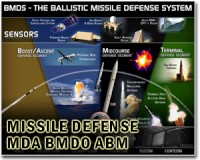| . |  |
. |
Brussels (AFP) Oct 15, 2010 The Russian ambassador to NATO voiced scepticism on Friday over an offer from the transatlantic alliance for Moscow to cooperate in a missile shield project for Europe. "We do not understand what cooperation we are talking about," ambassador Dmitry Rogozin said, one day after a NATO ministerial conference during which the alliance renewed an invitation to Russia to join the anti-missile system. "We do not really understand the sense of the project NATO is proposing," Rogozin said at a roundtable discussion in Brussels on NATO-Russia relations. Russia has been suspicious about the aims of the missile shield project even though NATO insists that the goal of the system is to protect Europe and North America from hostile states such as Iran and North Korea. "When we ask about the concrete technical parameters of the ballistic missile defence project, when we ask about the zone of application, who is nominated as the enemy in this case, we don't see a response," Rogozin said. Russia has asked NATO to limit the deployment of interceptors so they are solely used against short- and medium-range missiles and not aimed at Moscow's strategic deterrence, but NATO "does not want any limitations," he said. NATO Secretary General Anders Fogh Rasmussen, who has offered Russia the chance to join the anti-missile system, has also invited President Dmitry Medvedev to attend a summit in Lisbon next month. Russia has yet to respond to the invitation. Medvedev will meet on Monday with French President Nicolas Sarkozy and German Chancellor Angela Merkel in the French northwest seaside town of Deauville. Merkel and Sarkozy will need a lot of "conviction" to convince Medvedev of the virtues of a missile shield, Rogozin said. The ambassador also said he hoped the French and German leaders would give more information about NATO's "strategic concept," which will shape the alliance's vision for the next decade. The strategic concept has not been made public but it is expected to touch on modern threats such as missile strikes from "rogue" states and cyber assaults. NATO leaders will endorse the document in Lisbon on November 19-20.
earlier related report "The deterrent remains a necessity as long as certain countries continue to develop their nuclear arsenal or want access to the bomb," a senior Elysee palace official said. "A missile shield should complement, but only usefully complement the deterrent," the source added, three days before Sarkozy is to host Russian President Dmitry Medvedev and German Chancellor Angela Merkel for a summit. "Not only are we not against (the missile shield plan) but we are ready to contribute financially or in kind," the source said. On Thursday, US Secretary of State Hillary Clinton and Defence Secretary Robert Gates called during a visit to Brussels for NATO allies to invest in the missile-shield. Gates has put the price tag to link NATO members into a common anti-missile network at between 85 million and 100 million euros (120 million and 140 million dollars). NATO Secretary General Anders Fogh Rasmussen expressed optimism the missile shield would be endorsed by NATO leaders at a summit in Lisbon on November 19-20, saying it was well on the way to a "consensus." French Defence Minister Herve Morin, however, on Thursday expressed his "reservations" about the plan, saying Paris wanted more details about how much the system would cost and how it would work. Speaking in Paris on Friday, Rasmussen stressed that "anti-missile defence does not replace the deterrent, it completes it." He put the cost at "less than 200 million euros over 10 years shared between 28 nations. That seems bearable to me." "More than 30 nations possess or are trying to acquire ballistic missiles. We cannot ignore this problem and must have the means to prevent a missile being launched at our cities," he said. France, a nuclear-armed power, was also at odds with Germany, which backs the missile shield plan but is pushing for nuclear disarmament. "Some people in Germany, not all, feel that an effective missile shield could progressively replace deterrence," the Elysee source said. "France's position is very clear: the nuclear deterrent is part of the Atlantic alliance's fundamental framework, there's no question of changing that," the source said.
Share This Article With Planet Earth
Related Links Learn about missile defense at SpaceWar.com Learn about nuclear weapons doctrine and defense at SpaceWar.com All about missiles at SpaceWar.com Learn about the Superpowers of the 21st Century at SpaceWar.com
 US presses allies on missile shield
US presses allies on missile shieldBrussels (AFP) Oct 14, 2010 The United States urged NATO allies Thursday to invest in a missile shield and avoid harmful budget cuts at a rare meeting of defence and foreign ministers clouded by the war in Afghanistan. US Secretary of State Hillary Clinton and Defence Secretary Robert Gates made the plea, echoed by NATO Secretary General Anders Fogh Rasmussen, amid French reservations about the anti-missile system. ... read more |
|
| The content herein, unless otherwise known to be public domain, are Copyright 1995-2010 - SpaceDaily. AFP and UPI Wire Stories are copyright Agence France-Presse and United Press International. ESA Portal Reports are copyright European Space Agency. All NASA sourced material is public domain. Additional copyrights may apply in whole or part to other bona fide parties. Advertising does not imply endorsement,agreement or approval of any opinions, statements or information provided by SpaceDaily on any Web page published or hosted by SpaceDaily. Privacy Statement |